Introduction
Hair Loss After Covid is one of the side effects of Corona Virus. The SARS-CoV-2 virus is responsible for the viral infection COVID-19, which is also referred to as the coronavirus disease. Droplets that are released into the air when an infected person talks, coughs, or sneezes are the primary method by which the virus is spread. A worldwide pandemic caused by COVID-19 has resulted in widespread illness and death.
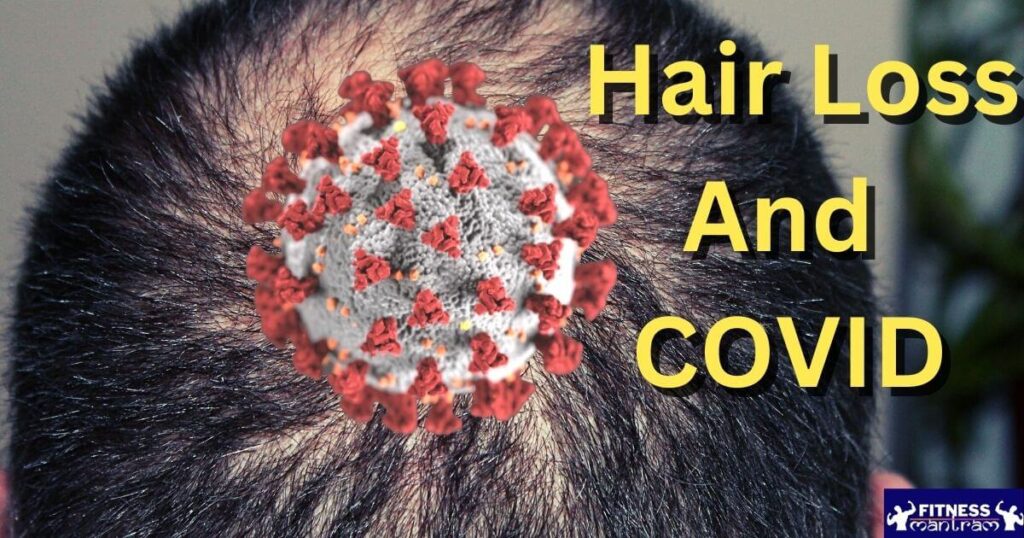
Hair loss is one of the more uncommon but still significant side effects of COVID-19. After recovering from the infection, many people who have contracted COVID-19 have reported experiencing hair loss. The possible causes of COVID-19-related hair loss, available treatments, and preventative measures will be discussed in this article.
People rarely lose their hair as a direct result of the COVID-19 infection. However, it is also possible for people to experience hair loss as a result of changes in their hair care routine during quarantine or the stress and anxiety associated with the pandemic. It is essential to consult a medical professional if you are concerned about hair loss. They will be able to identify the root of your hair loss and suggest possible treatments.
How Much Hair Loss Is Normal After Covid?
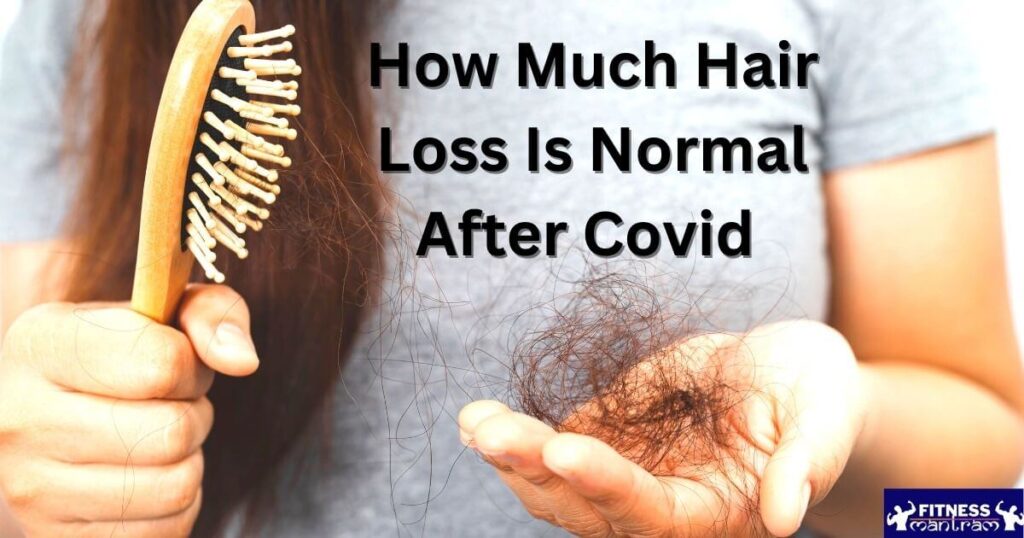
After a physical or emotional shock, such as the stress of an illness or surgery, it is uncommon for people to experience temporary hair loss. The term for this type of hair loss is telogen effluvium. Several months after the triggering event, hair can shed more than usual.
Due to the fact that it varies from person to person, it is difficult to define how much hair loss is “normal.” While some individuals may only notice a few more hairs in their shower drain or brush, others may experience thinning or bald patches. In most cases, the hair will begin to regrow on its own once the underlying cause has resolved.
It’s a good idea to talk to a doctor if you’re worried about losing your hair after getting COVID-19. They can help you figure out what’s causing your hair loss and suggest the right treatment.
How to Prevent Hair Loss After Covid?
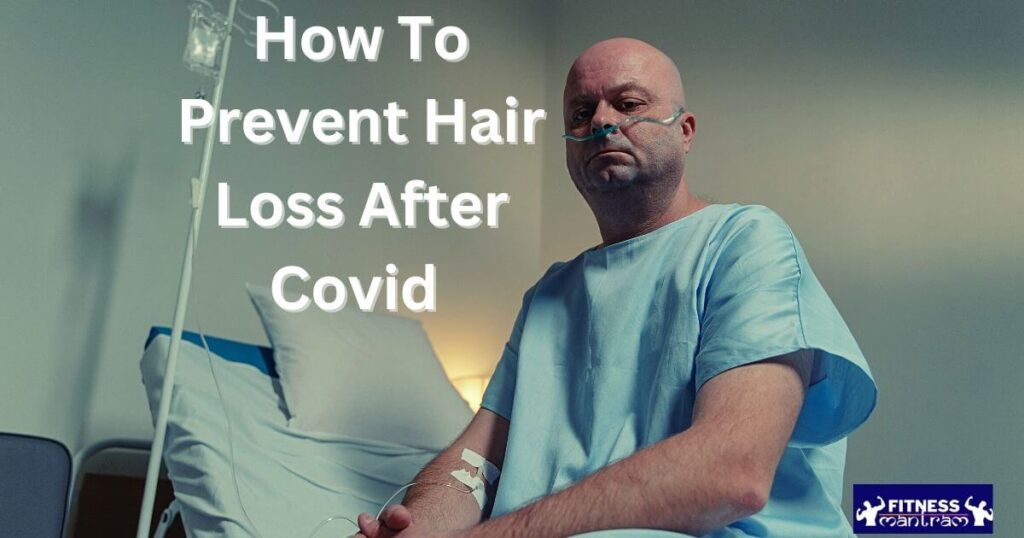
There is no scientific evidence to suggest that the COVID-19 infection causes hair loss at this time. During the pandemic, however, people frequently experience hair loss as a result of stress or changes in their hair care routine. Some ways to prevent hair loss are as follows:
- Eat a nutritious diet: Your hair’s health can be improved by eating a well-balanced diet high in protein, iron, and other essential nutrients.
- Stay away from harsh hair care methods: Hot water, tight hairstyles, and harsh hair care products can cause breakage and damage to your hair.
- Brush your hair gently: To avoid harming your hair and scalp, choose a brush with soft bristles.
- Stay away from heat styling tools: Use a heat protectant spray and keep the heat setting on low if you have to use heat styling tools.
- Reduce anxiety: Hair loss can be caused by stress, so try to reduce stress through activities like exercise, meditation, or therapy.
It is always a good idea to consult a medical professional for guidance and treatment options if you are concerned about hair loss.
Hair Loss After Covid Treatment And Vitamins
Hair loss following COVID-19 treatment can be a side effect of some medications used to treat the virus, as well as stress and illness brought on by the infection. Additionally, a lack of particular vitamins or nutrients may be the cause of hair loss. It is essential to speak with your healthcare provider to determine the root cause of your hair loss and the best course of action if you have received COVID-19 treatment. They might tell you to take some vitamins or supplements to help your hair grow and stay healthy. Taking good care of your hair and scalp, such as using gentle products and avoiding harsh styling methods, is also essential.
Best Vitamins To Prevent Hair Loss After Covid
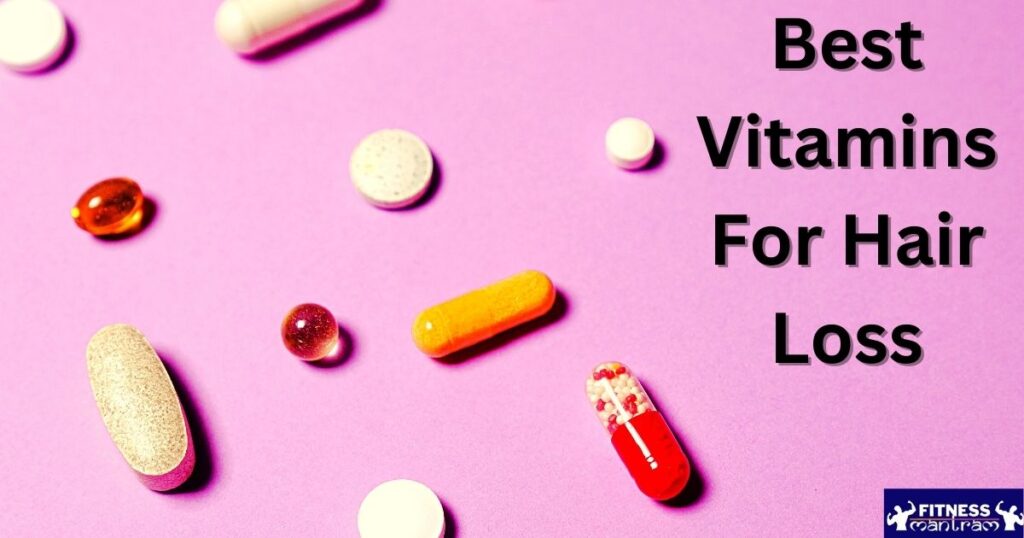
There are a number of vitamins that may help maintain healthy hair and stop hair loss. These are some:
- Vitamin A: This vitamin helps produce sebum, an oily substance that helps moisturize the scalp and keep hair healthy.
- Vitamin C: This vitamin helps promote healthy hair by assisting with the production of collagen, a protein that helps strengthen hair.
- Vitamin D: This vitamin helps promote hair growth by maintaining the health of the hair follicles.
- Vitamin E: This vitamin makes it easier for blood to flow to the scalp, which may help nourish the hair and make sure it grows in a healthy way.
- Vitamin B12: By supporting the well-being of the scalp and hair follicles, vitamins B like biotin, niacin, and pantothenic acid aid in hair growth and maintenance.
It is essential to keep in mind that a variety of factors, such as age, hormonal changes, genetics, and certain medical conditions, can lead to hair loss. Consult a medical professional for a proper diagnosis and treatment if you are experiencing hair loss.
Home Remedies For Hair Loss After Covid
There are several home remedies that may help reduce hair loss after COVID-19:
- Scalp massages: Massaging your scalp can improve blood flow to the hair follicles, which may help stimulate hair growth.
- Aloe vera: Aloe vera has nourishing properties that may help promote hair growth. You can apply aloe vera directly to your scalp or add it to your shampoo.
- Coconut oil: Coconut oil is rich in fatty acids and nutrients that may help nourish and strengthen your hair. You can apply coconut oil directly to your scalp and hair or use it as a deep conditioning treatment.
- Apple cider vinegar: Apple cider vinegar may help balance the pH of your scalp, which may help promote healthy hair growth. You can mix equal parts water and apple cider vinegar and use it as a rinse after shampooing.
- Green tea: Green tea contains antioxidants that may help promote healthy hair growth. You can apply cooled green tea directly to your scalp or add it to your shampoo.
- Rosemary oil: Rosemary oil may help stimulate hair growth and reduce hair loss. You can mix a few drops of rosemary oil with a carrier oil, such as coconut oil, and apply it to your scalp.
It’s important to keep in mind that the effectiveness of these home remedies may vary from person to person. If you are experiencing significant hair loss, it’s a good idea to speak with a healthcare provider for a proper diagnosis and treatment plan.
What Causes Hair Loss In Women
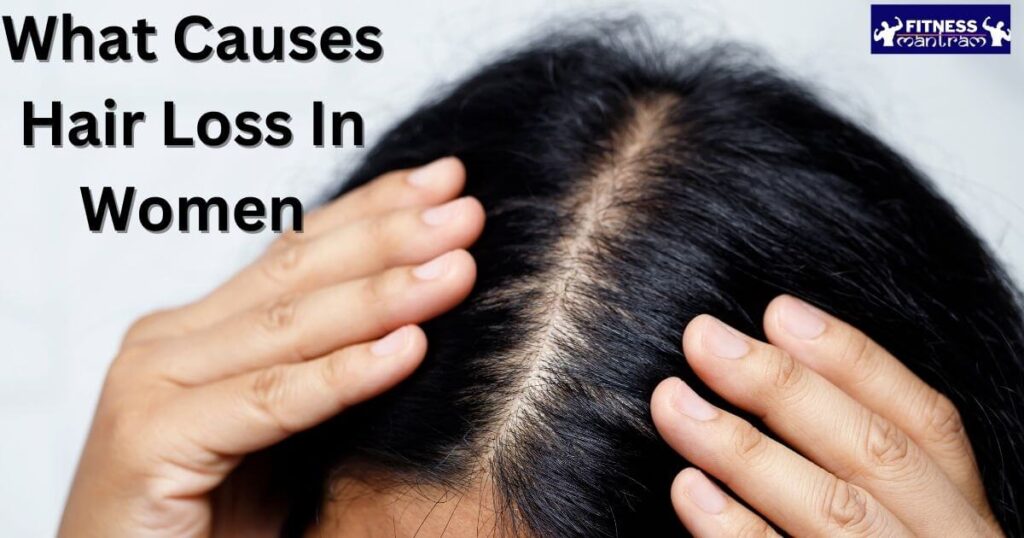
There are several different causes which affects the hair loss in women. Some common causes include:
- Iron deficiency anemia: Hair loss can be a sign of iron deficiency anemia, a condition in which the body does not have enough red blood cells to deliver oxygen to the body’s tissues.
- Telogen effluvium: This type of hair loss occurs when the hair growth cycle is disrupted, causing the hair to shed more than usual. Telogen effluvium can be caused by physical or emotional stress, hormonal changes, certain medications, or sudden weight loss.
- Androgenetic alopecia: Also known as female pattern hair loss, this type of hair loss is caused by a combination of genetics and hormones. This is the most common reason of hair loss in women.
- Alopecia areata: The immune system attacks the hair follicles in this autoimmune disorder, resulting in hair loss.
- Thyroid problems: Abnormal levels of thyroid hormones can cause hair loss.
- Certain medications: Some medications, such as those used to treat cancer, can cause hair loss as a side effect.
It’s important to see a doctor if you are experiencing hair loss, as it can be a sign of a more serious underlying condition.
Hair Loss Treatment For Women
There are many different types of hair loss treatment options available for women experiencing hair loss. These may include:
- Medications: There are several medications that can be taken orally or applied topically to the scalp that may help to slow or stop hair loss in women. Some examples include minoxidil, finasteride, and spironolactone.
- Hair Transplant: A hair transplant is a surgical procedure in which hair is removed from a part of the scalp where it is plentiful and transplanted to an area of thinning or baldness.
- Laser Treatment Therapy: One of the another kind is Low-level laser therapy (LLLT) in this treatment, low-level lasers are used to stimulate hair growth.
- Platelet-rich Plasma (PRP) Therapy: PRP therapy involves injecting a concentrated solution of platelets into the scalp to stimulate hair growth.
- Scalp Micropigmentation: Scalp micropigmentation is a cosmetic procedure in which pigment is applied to the scalp to create the appearance of thicker, fuller hair.
It’s important to consult with a dermatologist or other medical professional to determine the best treatment option for you.
Click The Below Link👇 For Best Hair Loss Treatment Solution For Women
Conclusion:
However, from the above article we come to the conclusion that hair loss is a common side effect of many different types of illness, including COVID-19. Hair loss can occur as a result of the body’s immune system attacking the hair follicles, as can happen in cases of alopecia areata, or as a result of physical or emotional stress, which can cause telogen effluvium. Some people may also experience hair loss as a result of medications they are taking to treat COVID-19 or other conditions. It is important to speak with a healthcare professional if you are concerned about hair loss, as they can provide advice on the best course of action.
Frequently Asked Question:
How To Stop Hair Loss After Covid ?
There is currently no scientific evidence to suggest that COVID-19 (the disease caused by the coronavirus) causes hair loss. There are many reasons for hair loss which is caused by a variety of daily routine factors like poor diet, certain medications, other medical illness conditions and even due to genetics problem. If you are experiencing hair loss and are concerned about it, I recommend speaking with a healthcare professional. Consulting the medical practitioner will help you determine the root cause of your hair loss and they will you with the best recommend appropriate treatment options. In the meantime, you can try the following tips to help maintain the health of your hair:
- Eat a healthy, well-balanced diet that includes plenty of protein, which is essential for healthy hair.
- Avoid using heat styling tools excessively, as they can damage your hair.
- Use a gentle shampoo and conditioner and avoid harsh chemicals, such as those found in some hair dyes and styling products.
- Avoid tight hairstyles, such as ponytails and cornrows, as they can cause damage to your hair and scalp.
- Try to minimize stress, as it can contribute to hair loss.
- Avoid styling your hair while it is wet, as it is more prone to breakage when it is wet.
If you are taking medication that may be causing your hair loss, talk to your doctor about switching to a different medication or adjusting your dosage.
How To Stop Hair Fall And Ways To Regrow Hair Naturally?
There are several things you can try to help stop hair loss and regrow hair naturally:
- Regularly Massage your scalp this will stimulate the blood flow which in turn promote hair growth.
- Avoid tight hairstyles, such as ponytails or braids, which can pull on your hair and cause it to fall out.
- Use a gentle, sulphate-free shampoo and conditioner to avoid damaging your hair.
- Avoid using hot tools, such as hair dryers and straighteners, on your hair too frequently.
- Eat healthy, balanced diet rich in proteins, vitamins, and minerals to support hair growth.
- Consider taking supplements, such as biotin, iron, or folic acid, to support healthy hair growth.
- Get plenty of rest and manage stress levels, as both can affect hair growth.
- Avoid using harsh chemicals, such as hair dyes, on your hair.
- Try using natural remedies, such as coconut oil or aloe vera, to nourish your scalp and hair.
It’s essential to keep in mind that each personal hair is different and the things which will works for one person will probably may not work for another. It may take time to see results and it’s important to be patient and consistent in your efforts to regrow your hair naturally.
What Vitamin Deficiency Causes Hair Loss?
There are several vitamin deficiencies that can cause hair loss, including deficiencies of vitamin D, vitamin B12, and biotin.
- Vitamin D deficiency can cause hair loss because it plays a role in hair growth and cycling. When your body doesn’t get enough vitamin D, your hair follicles may enter the resting phase too early, leading to hair loss.
- Vitamin B12 deficiency can also cause hair loss because it helps to create red blood cells, which are responsible for carrying oxygen and nutrients to your hair follicles. Without enough vitamin B12, your hair may not receive the nutrients it needs to grow properly.
- Biotin deficiency can cause hair loss because biotin is a B-complex vitamin that is important for healthy hair growth. A deficiency of biotin can lead to dry, brittle hair that is more prone to breaking and falling out.
If you are experiencing hair loss and suspect that it may be due to a vitamin deficiency, it is important to speak with a healthcare provider. They can help to diagnose the cause of your hair loss and recommend appropriate treatment options.
Can Dandruff Cause Hair Loss?
Dandruff itself is not a cause of hair loss, but it can lead to hair loss if it is not treated. Severe dandruff can cause irritation and scratching of the scalp, which can lead to inflammation and, in extreme cases, scarring of the scalp. Scarring of the scalp can cause permanent hair loss. So, it is important to treat dandruff to prevent potential hair loss. You can treat dandruff by using over-the-counter dandruff shampoos or by using home remedies such as tea tree oil or apple cider vinegar. If your dandruff persists despite treatment, you should consult a dermatologist.
Drinking Sugary Soda Causes Hair Loss?
According to new research, men who consume one soda or sugary beverage per day are more likely to experience hair loss. Consuming an excessive amount of sugar may lead to insulin resistance, which can be detrimental to one’s hair and overall health over time. Drinking sugary beverages may be linked to hair loss in younger men, according to new research. Hair loss can also be caused by a variety of factors, including genetics, age, hormones, and certain medical conditions. Some research has suggested that a high-sugar diet may contribute to poor health overall, which could potentially affect hair health, if you are concerned about hair loss, it is important to speak to a dermatologist or other healthcare professional for a proper diagnosis and treatment plan.
Read More
- Mental Health Matters
- Nutrient Survival
- The Growing Epidemic of Obesity
- A Guide to Clothing-Optional Practice
- How To Get Rid Of Neck Fat
Disclaimer: The details & information given here in this article is based on information as available on other published site on internet. Do take medical advice before adopting it. Fitness Mantram Does Not Confirm It. This site contains affiliate links. If you choose to make a purchase after clicking a link the author/owner/creator may receive a commission at no ADDITIONAL cost to you. Thank you for your support!
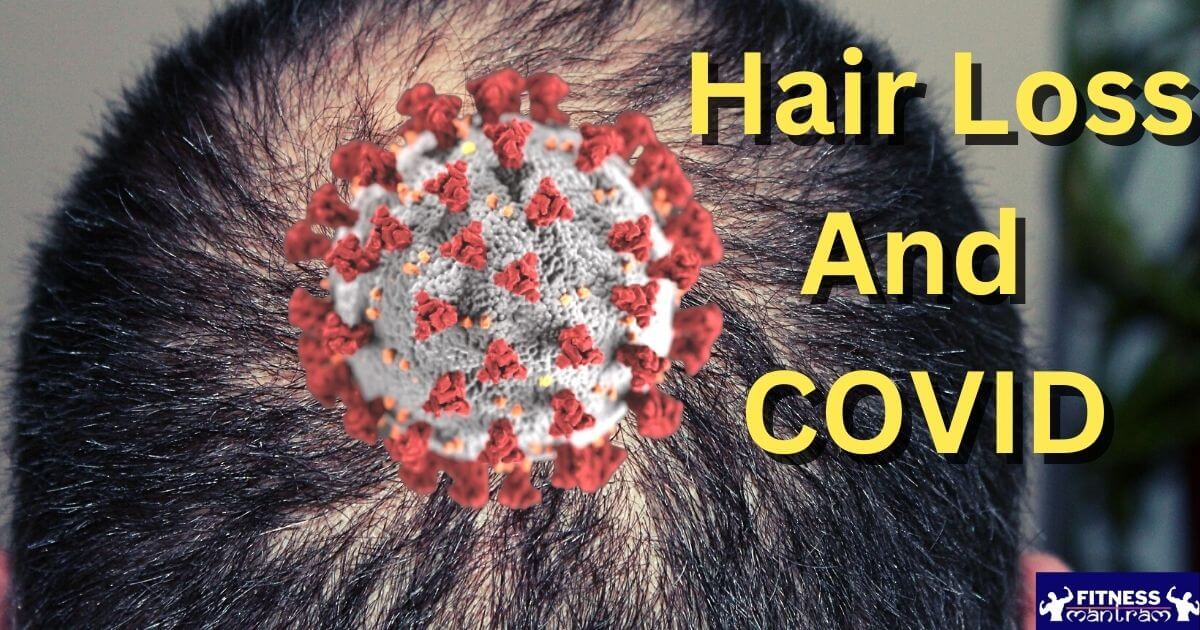
3 thoughts on “Hair Loss After Covid :The Hidden Side Effect Of Covid-19”